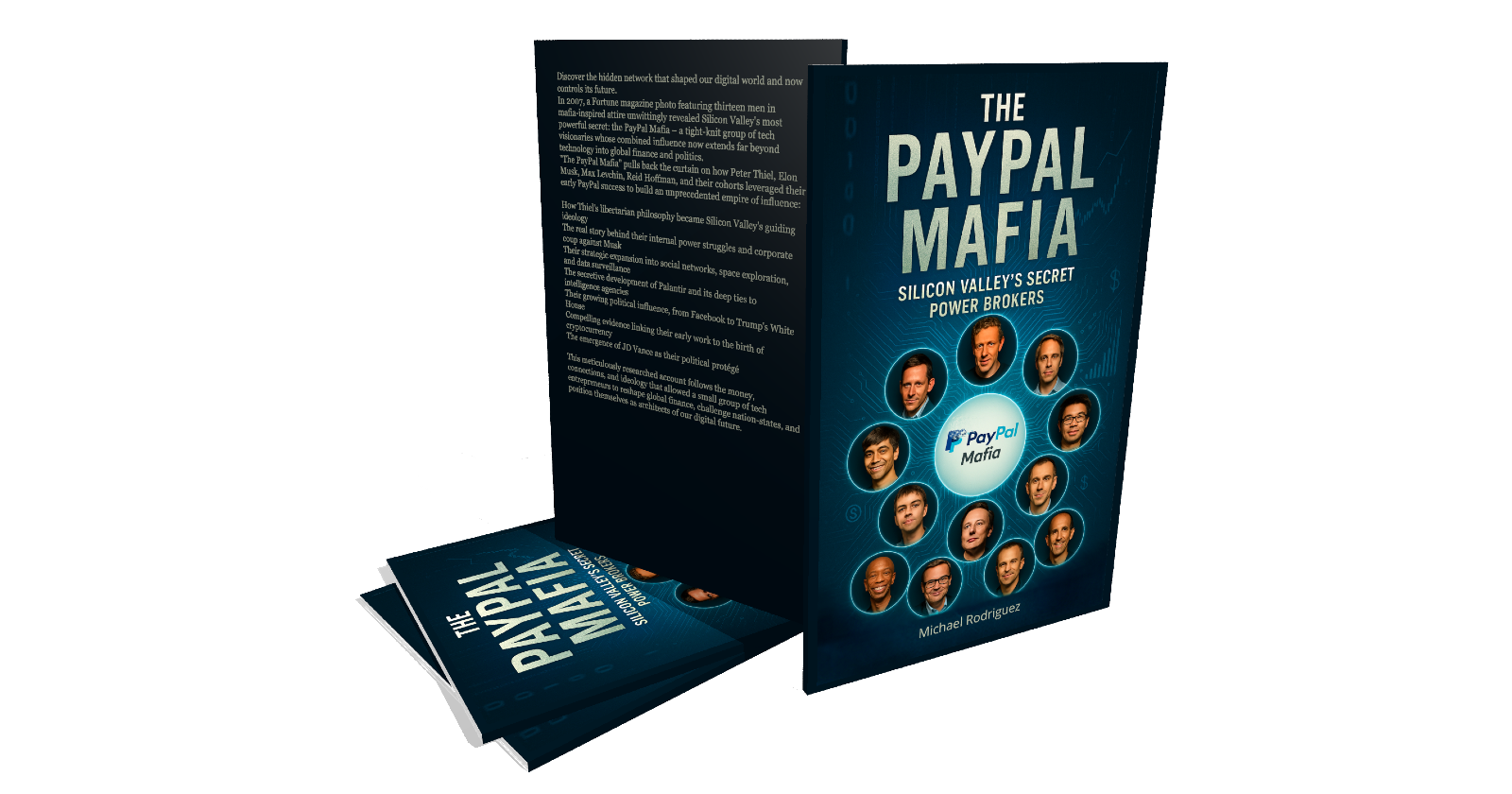Digital Kingmakers: How Tech Giants Are Reshaping Global Politics
 Michael Rodriguez
Michael Rodriguez
This article builds on research from my book "The PayPal Mafia: Silicon Valley's Secret Power Brokers"
From Code to Political Power
In 2010, technology executives were largely absent from major political discussions. By 2023, they had become central players in shaping everything from election outcomes to geopolitical crises. This transformation represents one of the most significant power shifts of the 21st century.
My research into the PayPal network revealed a pattern that has now expanded across Silicon Valley: founders who leveraged technical and business success into unprecedented political influence.
The Three Vectors of Tech-Political Power
Silicon Valley's political influence operates through three distinct channels:
1. Platform Power
Tech companies create and control the digital infrastructure through which political information flows and public opinion forms:
Social media platforms determine which voices are amplified or suppressed
Search algorithms shape what information is easily accessible
Content moderation decisions effectively set boundaries of acceptable discourse
When Mark Zuckerberg testified before Congress, one senator bluntly observed: "You don't just have a seat at the table. You own the table."
2. Financial Influence
Technology wealth has transformed traditional political fundraising:
Silicon Valley now outspends Wall Street in political contributions
Tech billionaires fund their own political organizations outside party structures
Venture capitalists increasingly back candidates who support crypto-friendly regulations
According to Federal Election Commission data, tech-sector political contributions have increased by over 400% since 2012.
3. Ideological Projects
Most intriguingly, tech leaders have begun funding ambitious ideological and governance experiments:
Charter cities and special economic zones
Alternative voting systems and digital democracy tools
Think tanks advancing technological solutionism
Political candidates promoting tech-friendly policies
The Four Centers of Tech Political Influence
My analysis identifies four primary hubs of tech-political power:
The PayPal Network
As documented in my book, this group pioneered the model of converting tech success into political influence:
Peter Thiel's support for candidates and political movements
Elon Musk's growing influence on policy debates across multiple countries
David Sacks and other former PayPal executives funding political campaigns
The Y Combinator Ecosystem
Sam Altman, Paul Graham, and others from the YC network have developed a distinct approach:
Focus on long-term policy around AI safety and regulation
Funding basic income experiments
Supporting policy entrepreneurship through organizations like Fast Forward
The Facebook Orbit
Mark Zuckerberg and former Facebook executives have built:
The Chan Zuckerberg Initiative influencing education and criminal justice policy
A network of former executives in government roles
Lobbying apparatus across multiple continents
The Crypto Coalition
Perhaps most ideologically motivated, cryptocurrency founders and investors have:
Funded candidates specifically to advance regulatory approaches
Established political action committees across jurisdictions
Developed comprehensive legal reform strategies
When Silicon Valley Collides with Washington
These new power centers frequently clash with traditional political structures, creating tensions around:
Expertise and Legitimacy: Tech leaders often position themselves as problem-solvers while lacking governance experience
Accountability: Private influence without democratic checks and balances
Sovereignty: Companies operating at scales that challenge national governance
Values Alignment: Technical optimization versus democratic deliberation
The Surprising Role of Philosophy
Perhaps most fascinating is how philosophical frameworks drive tech-political engagement:
Effective Altruism guiding AI safety advocacy
Libertarianism undergirding cryptocurrency political projects
Techno-optimism influencing infrastructure and scientific funding
Rationalism and Longtermism shaping approaches to existential risk
The Path Forward
As technology companies and their founders continue expanding their political influence, several questions become critical:
Democratic Integration: How can technological power be integrated into democratic systems?
Transparency: What disclosure standards should apply to tech political influence?
Global Governance: How should international institutions respond to corporate actors with multinational reach?
Citizen Agency: How can ordinary citizens maintain meaningful input in this new landscape?
The resolution of these questions will shape the future of governance in the digital age. As I continue researching the intersection of technology and political power, one thing becomes increasingly clear: the traditional boundaries between these domains have permanently dissolved.
For more analysis of how technology leaders are reshaping global politics, explore my work here.
Subscribe to my newsletter
Read articles from Michael Rodriguez directly inside your inbox. Subscribe to the newsletter, and don't miss out.
Written by

Michael Rodriguez
Michael Rodriguez
Michael Rodriguez is a renowned economic analyst and investigative journalist specializing in the intersection of technology, finance, and political power. With over fifteen years of experience researching global power structures and financial markets, Michael brings a unique perspective to understanding how technological innovation transforms society and reshapes traditional power dynamics. "The PayPal Mafia: Silicon Valley's Secret Power Brokers" represents his most comprehensive investigation into the network of entrepreneurs and investors who have fundamentally altered the technological landscape and are now increasingly influencing political systems worldwide. His previous works include "The Trillion Dollar Shadow: Vanguard, John Bogle, and the New Financial Order," which explored how index investing transformed the economic landscape; "The Chinese Real Estate Bubble," a comprehensive analysis of China's economic model; "Stoicism in Business," examining the application of ancient philosophical principles in modern entrepreneurship; "Technological Breakthroughs of World War II: How War Changed Our World"; and "Silver Empire: The Forgotten Metal That Powers Modern Civilization." Michael's interdisciplinary approach combines economic analysis, technological expertise, and political insight, allowing him to trace the complex connections between Silicon Valley's innovators and their growing influence on global governance. His work on the PayPal Mafia illuminates how a small group of visionaries have leveraged their initial success in digital payments to reshape multiple industries and challenge traditional state authority. A frequent speaker at technology conferences and economic forums, Michael has been featured in publications including The Wall Street Journal, The Economist, and Wired. He holds degrees in Economics and International Relations from Georgetown University and previously worked as a financial analyst before dedicating himself to full-time research and writing. Through his meticulous research and accessible writing style, Michael continues to decode complex power systems for readers seeking to understand the hidden forces shaping our technological future and its implications for democracy in the digital age.